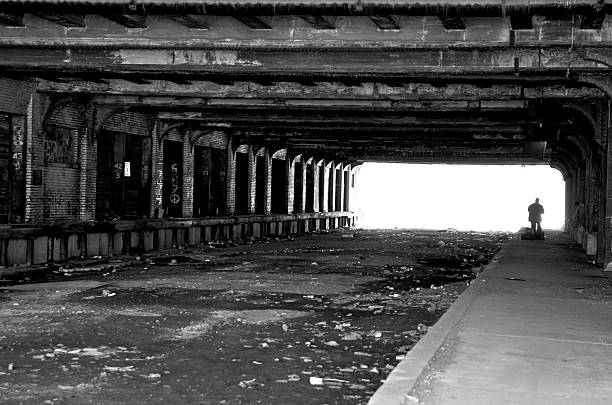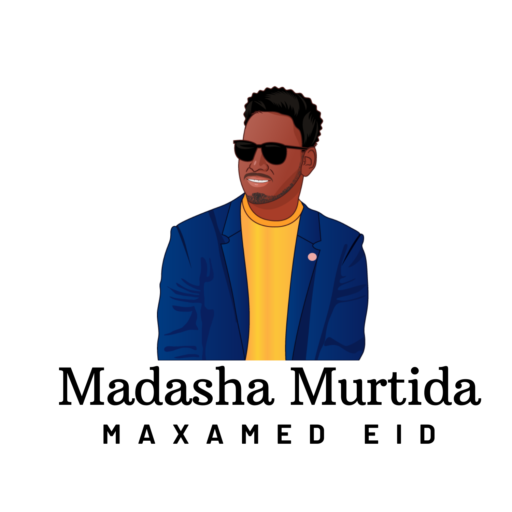
The Weight of Nowhere
Mohamed Eid
I grew up under a bridge in Hargeisa. It wasn’t a home. It was just a slab of concrete where the forgotten kids of the city gathered like shadows. Every night, we fought for space to sleep. The older boys always won. They had fists, and they weren’t afraid to use them. I still carry the scars on my face from the times I thought I could fight back.
During the day, we scattered across the streets, begging for food and stealing when we had to. People didn’t see us as children. To them, we were dibjir—rootless nobodies with no family, no tribe, and no place in society. Some of the boys sniffed glue to forget the hunger and cold. I didn’t. I couldn’t afford to lose my edge. On the streets, you either stayed sharp or you didn’t survive.
But even in the darkest corners of Hargeisa, there was one person who saw me.
She wasn’t my mother. I don’t know who my mother was, or my father for that matter. The old woman who raised me found me abandoned as a baby, wrapped in a cloth near the market. She wasn’t rich—she sold tea and sweets from a tiny stall on the street—but she gave me something no one else ever had: care.
She taught me to speak, told me stories, and held me when I cried. She wasn’t just kind; she was everything. But the streets don’t let you keep what you love.
She was killed by a police car while trying to cross the road. I remember the chaos around us—the shouts of vendors arguing, the honking of cars, and the dust swirling in the hot air. She held my hand tightly as we weaved through the crowd, her small frame moving with a determination I’d come to admire. But the streets that day were busier than usual. People pushed and shoved, everyone in a hurry to get somewhere.
“Stay close,” she told me, her voice steady, even as the crowd surged around us.
We were halfway across the road when it happened. A police car, speeding as if the siren wasn’t enough to part the sea of people, came out of nowhere. The crowd scattered like leaves in the wind, but she stumbled. Her hand slipped from mine, and she fell to the ground.
I screamed her name, reaching out to pull her back, but it was too late. The car didn’t stop. It hit her and kept going, as if she was nothing more than a piece of trash in the road. I ran to her, falling to my knees beside her crumpled body.
“Help!” I shouted, my voice breaking, my hands shaking as I tried to lift her. “Someone, please help!”
I sat there for what felt like hours, rocking back and forth, holding her close. The sun began to set, casting long shadows across the road. Her blood had dried on my hands, but I didn’t notice. All I could think about was how warm her hand had felt in mine just moments before.
People passed by, stepping around us, their faces expressionless. Some glanced down at her, then quickly looked away, as if not seeing would absolve them of responsibility. No one stopped. No one asked if she was still alive. No one offered to help or even called for someone to take her to the hospital.
Then, when it became clear the police weren’t coming back, the crowd began to gather. Slowly, cautiously, as though death had given them permission to approach. They didn’t look at me—they only looked at her. A man bent down and touched her wrist, checking for a pulse. He shook his head and stood up.
“She’s gone,” someone murmured.
Another voice chimed in, this one older, resigned. “She was from those tribes. No one will do anything.”
There was a quiet murmur of agreement, and then they began to move. A group of men lifted her body, wrapping her in a thin cloth someone had brought from a nearby stall. I stood there, frozen, as they carried her away. They didn’t ask who I was or if I needed help. They didn’t even look at me.
I followed them for a few steps, calling out weakly, “Wait! Where are you taking her?”
One of the men turned, his face weary. “She’s dead, boy. Go back to where you came from.”
And just like that, they were gone. They took her away, disappearing into the crowd, and left me standing in the middle of the street.
I stood there for what felt like an eternity, staring at the empty space where she had been. The sun was almost gone now, the shadows long and dark, swallowing the city. I looked around, searching for someone—anyone—who might see me, who might care. But the people who had gathered to take her body had dispersed.
No one asked about me. No one wondered if I had somewhere to go. I was just another boy in the streets, just another shadow.
It was in that moment that I realized something that would stay with me for the rest of my life: no one was coming for me. Not then, not ever.
I screamed for her, tugged at her lifeless body, but no one stopped to help. I stayed there until her blood dried on my hands. When I finally walked away, I wasn’t the same.
After that, the streets became my only home.
The boys under the bridge took me in, but it wasn’t out of kindness. They taught me to fight, to steal, to survive. But I was still dibjir. In Somalia, your tribe is your backbone, and I didn’t have one. People treated me like dirt because I had no roots. I grew to hate them for it—the shopkeepers who chased me away, the men who called me names, the families who pulled their children close when I walked by.
When I heard about tahriib, I didn’t hesitate. They said Europe was a place where no one cared about your family, your tribe, or your past. A place where someone like me could finally be free.
But freedom wasn’t free.
I didn’t have money to pay the smuggler, so I stole it. There was a small shop I’d been watching for weeks. The old man who ran it wasn’t careful. One evening, I slipped inside, pretending to browse. My hands shook as I reached behind the counter and grabbed the stack of cash.
He turned just as I ran out the door. My heart pounded as I darted through the streets, clutching the money like it was my lifeline. Guilt clawed at me, but I shoved it down. That money wasn’t just a way out—it was my ticket to survival.
The desert didn’t care about my survival.
The truck we rode in broke down after two days. The smuggler barked in Arabic, pointing at the endless horizon. We had to walk.
Three days. Three days of sun that burned our skin and sand that clawed at our feet. The water ran out on the first day. By the second, my tongue felt like sandpaper, and my lips were cracked and bleeding. People began to lose their minds.
One man urinated into a bottle, and others fought over it like animals. I joined the chaos without thinking. Someone’s fist smashed into my face, and I tasted blood. I clawed and swung wildly until I grabbed the bottle. The liquid was warm and bitter, but I drank it anyway. It burned my throat, but it kept me alive.
By the third day, people started collapsing. A boy my age fell beside me, whispering prayers I couldn’t understand. He begged me not to leave him, but I did. I had to. In the desert, kindness is death.
Libya was hell.
They called it a “camp,” but it was a prison. The guards made us work like animals, carrying crates and digging trenches under the blazing sun. If you moved too slowly, they beat you.
One day, I dropped a crate. My body couldn’t take it anymore. The guard slammed me to the ground and struck me with the butt of his rifle. Blood poured from my nose as he kicked me in the ribs, laughing. I wanted to fight back, but I couldn’t.
That night, I lay on the filthy floor, staring at the ceiling. My ribs ached with every breath. My face was swollen. But my hate kept me alive.
The boat was the final test.
When I saw it, my heart sank. It wasn’t a boat—it was an inflatable raft, barely holding together. They packed us so tightly we couldn’t move.
The waves were merciless. They tossed us like toys, drenching us in freezing seawater. People screamed, cried, and prayed. Some just stared blankly, their hope long gone.
I clung to the edge, my knuckles white, my heart pounding. Every wave felt like it would swallow us whole. After three days, a rescue boat found us. They pulled us aboard and gave us food and water. I didn’t cry. I just sat there, staring at the endless sea.
Italy wasn’t the paradise I imagined. The streets were filled with people like me—immigrants who had survived tahriib only to end up homeless again. I begged for food, slept under bridges, and faced the same cold stares I’d known in Hargeisa.
When I finally made it to America, I thought things would change.
I found work in a warehouse, lifting boxes for hours. It wasn’t much, but it was enough to rent a small room. But even here, among my own people, I was an outsider.
One night, I sat in a Somali café in Minneapolis, sipping tea. A group of men at the next table were arguing.
“Tribalism destroyed us,” one said, slamming his fist on the table.
“No, it was corruption!” another shot back. “Your clan just made it worse.”
The third man laughed bitterly. “We’re in America, and we’re still talking about clans? Somalia’s problems followed us here.”
They turned to me. “What do you think, brother? Does Somalia have hope?”
I looked at them, then at the steaming cup in my hands. “Hope doesn’t matter,” I said. “Not if we keep carrying the same wounds. Not if we can’t even see each other as people.”
They stared at me, confused. I sighed. “I don’t have a clan. I don’t even know my father’s name. I was born on the streets, raised by an old woman who was killed in front of me. After that, I lived under a bridge, fighting for scraps. And you know what Somalis called me? Dibjir. A nobody.”
The room fell silent. Their stares burned into me, but I didn’t care.
“I hated you,” I said, my voice shaking. “I hated all of you for treating me like I didn’t exist. And now, here we are, in a country that doesn’t care who we are, still clinging to the same divisions that broke us.”
I stood up, leaving my untouched tea on the table. As I walked out into the cold night, I realized something:
The hardest part of tahriib wasn’t the desert, the camp, or the sea. It was surviving the hatred—of others, of myself, of everything I thought I couldn’t escape.
Maybe I’ll never escape it. But maybe the fight isn’t about escaping. Maybe it’s about learning how to carry the weight without letting it crush you.
Mohamed Eid
